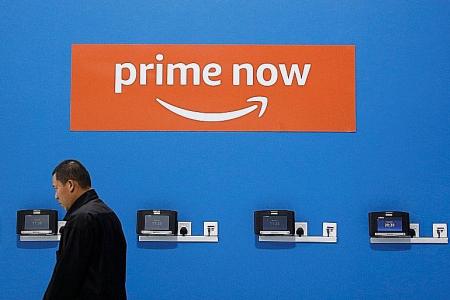Convenience, not price, crucial for e-retailers
New entrant Amazon Prime Now is heating up the competition and underscoring logistical challenges here
Customers should not count on a protracted price war being sparked by Amazon's introduction of its Prime Now service here, said experts.
Prime Now, launched here last month, is the American retail giant's much vaunted fast delivery service, with a stated turnaround time of two hours.
But recent difficulties in placing and receiving orders within that time have underscored logistical challenges here.
Still, Prime Now's debut could push other retailers to focus on delivery time and other ways to stand out from the crowd, the experts added.
E-commerce companies must also decide whether they want to adopt a retail model where they hawk their own wares or a marketplace model where they serve as a platform for third-party vendors.
Last year, a report from Google and state investment firm Temasek Holdings put the value of Singapore's e-commerce market at $1 billion, or 2.1 per cent of all retail spend.
The Government has set an ambitious target of e-commerce making up 10 per cent of all retail receipts by 2020 - well ahead of the joint Google and Temasek report's projections of 6.7 per cent by 2025.
Visa country manager for Singapore and Brunei Ooi Huey Tyng said: "There is significant transformation in the service model, especially for transportation, meal delivery and groceries delivery."
Associate Professor Lewis Lim of Nanyang Technological University's Nanyang Business School thinks Amazon's decision to swoop in on household goods was a savvy specialisation.
But he cautioned that "they have perhaps over-promised with the Prime Now service", given the backlog of orders that almost immediately ensued.
He added that, whether or not Amazon succeeds in living up to its two-hour delivery schtick, it has already created "new market expectations on the part of the consumers".
And if Amazon gets it right, the convenience of fast deliveries can make up for prices that are not the lowest, he noted.
Economist Jochen Krauss, a managing partner at international pricing consultancy Simon-Kucher & Partners, agreed that prices may not erode, even with Prime Now in town.
"A lot of companies don't want to do that, but they somehow actively or by chance come into a price war mode where they think they can drive purchase or volume by lowering prices, and many times it actually doesn't play out," he said.
Prof Lim and Dr Krauss both noted the appeal of being a "time player".
Similarly, online retailer Lazada Singapore's chief executive, Mr Alexis Lanternier, told The Straits Times: "There is growing interest in our 'Express' channel, where products are delivered within the same day of ordering."
The turnaround, he said, is "thanks to our partnerships with established, home-grown logistics partners SingPost and Ninja Van".
As the e-commerce landscape matures, companies could turn to innovative models to meet customers' needs.
For example, Dr Krauss suggested, grocery retailers could have air-conditioned pick-up points at transport hubs such as MRT stations, or tap on convenience stores' facilities to stash products awaiting collection.
As the Government pushes to expose local retailers to a bustling e-commerce market, one possible future could see local small- and medium-sized enterprises (SMEs) roped into the big boys' supply chains.
Explaining his modus operandi, Mr Lanternier said: "Lazada's success is fuelled by our expanding network of e-commerce partners: local sellers, third-party logistic vendors, suppliers, SMEs and like-minded partners."
FOR MORE, READ THE STRAITS TIMES TODAY
Get The New Paper on your phone with the free TNP app. Download from the Apple App Store or Google Play Store now



